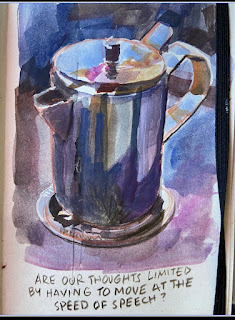Here’s a question: Are our thoughts limited by having to move at the speed of speech?
And a bigger question: How is our mental life constrained by speech altogether?
These questions elicited a lot of lively discussion on my Instagram account. To the broader question, Rosemary reminded me of the truth and limitations of the Sapir-Whorf Hypothesis, also known as linguistic relativity, which argues that our thought is shaped by language we speak.
One problem with such a theory is that it tends to assume that all thought is verbal. Artists, musicians, architects, and engineers know otherwise. We can form purely visual or musical ideas which surely qualify as a form of thought or reasoning. If you’ve ever had an artistic encounter with another artist with whom you share no spoken language, you know that those visual ideas can be shared between people no matter what languages they speak.
Regarding the first question about the speed of thought, it occurs to me that when we are speaking, our language necessarily places upper limits on the pace at which we can roll out ideas, a problem for human-computer interfaces. An artificial intelligence can generate paragraphs in milliseconds, but it takes us a lot of time to type or say a series of ideas.
Sometimes I have the opposite problem, where my brain works a little too slowly to articulate a sentence fluently, so the result almost sounds like aphasia. I believe that for most people, our receptive capacity for language by timing how fast you can read, or while listening to an audio book by doubling or tripling the normal speech velocity. You can demonstrate this on YouTube or your favorite podcast app by increasing the speed settings on audio playback.
Certain non-linguistic modes of thought don’t seem to be limited by velocity of expression. For example, the thought that goes into solving a Rubix cube seems almost like an instantaneous pattern recognition, and the act of puzzle solving appears to be limited only by the neuro-muscular action of the hands.
To me, the limitations of language become clearest when trying to translate a memory of a dream after awakening. Rendering a dream into words is like trying to taxidermy a jellyfish. The act of trying it makes me realize how words can do violence to certain kinds of non-logical ideas.







